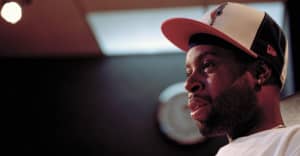J Dilla was more than just a pioneering producer with savant-like sensibilities and awe-inspiring drum kicks. On the long-awaited The Diary, he flexes his skills as a writer and formidable emcee. The project was originally set for release in 2002 under MCA Records but, due to lengthy legal battles, it was shelved for 14 years. In April 2016, Dilla’s final opus arrived via Mass Appeal Records with backing from Nas, his younger brother Illa J, and a bevy of collaborators. The Diary is a gaze into Dilla’s creative evolution and a testament to his all around mastery and understanding of music.
The FADER spoke with Illa J, Bilal, and producers Nottz and Karriem Riggins about their experiences in making the album and working with a legend in real time.
Although J Dilla had become known for his genius as a producer, he was just as serious about wanting to bridge the gap between being a force behind the scenes and behind the mic.
ILLA J (singer/J Dilla's younger brother): It was dope to see this come out because this was a special project for my brother; he wanted to showcase his vocals and his songwriting. People were so focused on his song production that I feel a lot of people overlooked his versatility as an artist. He could DJ, he could write, rap, sing, produce. [The Diary] definitely showcases his vocals and his writing because there were a lot of different producers on the project, and that was his purpose for doing that. Like, “This is going to be the project where I don’t do all the beats.”
BILAL (vocalist/songwriter): Around that time [in the early 2000s], he had just put out the Slum Village project. When we first started working together up until the last time, I saw his development. I remember him telling me that he rapped. I was like, “Wow” when I started hearing the stuff that he was doing with Common. His whole development was kind of the same way that he produced. He made it look so effortless. It didn’t look awkward or weird — it was a natural thing.
KARRIEM RIGGINS (Producer): It would surprise me every time when he dominated verses. Every time. He was so talented and could sing as well. He could play drums; he was piano-based and multifaceted.
Dilla had a clear vision of how he wanted the tracks on The Diary to sound, and trusted his collaborators to create freely on the album.
BILAL: When I came in, he had already had his verses down for “The Ex,” so he really just told me the concept of the record; he’d just left me in the studio. He would always pick me up from the airport in the morning and take me to the studio. This was around the time when we had gotten a little closer. I didn’t have a middle man, like a manager dropping me off. He always had cool shit in his car. He had a crazy Range Rover and he would play some of the craziest shit on the way to the studio. By the time we got there, I was well acclimated to his whole vision. Then, he would put the record on; he’d already kind of laid out his verses on the song. He was like, “Just go. Do whatever you want to do.”
He just rolled out when I went into the room because I like to go in and figure out the chords to the piano for the song and play along to the track, so I can understand where my melody could go. While I was in there doing that and jotting down lyrics, he rolled out and just gave me my space and then came back. It really worked from there. He was really brilliant like that, because a great producer knows how to guide the situation. He really had trust and he wasn’t overbearing. He made you think you were doing it yourself but the whole time, he was flying it. [Laughs] The best way that I can put it, is that it was natural. Dilla really created an atmosphere that was really organic and pretty much easy flowing so it didn’t feel like we were creating half of the time. It was like we were hanging out.
NOTTZ (producer/rapper): I just did my thing on “The Shining Pt.1.” He didn’t make any changes or anything. He was like, “Just do what you do.” He told me he was a big fan and I told him, “I’m a big fan of you, bruh.” It was one of my favorites. I did the original to “Fight Club” in the studio with Dilla. My homeboy Boogie, we were a group in high school, I brought him along and Dilla fucked with him. He was very trusting.
KARRIEM RIGGINS (producer): The first collaboration was when I did the drums for “To You, For You” on Fantastic Vol. 2. Initially, I was going into the booth and recording those drums. He was walking back into the control room and I was thinking that maybe I had to go back in and record some other ideas so that he could compile some options for the song. He used that one take and just chopped it up on the spot. He was very on the spot, a one-take-Jake type of guy. He would make it happen out of whatever he had. He'd hear it and then see that vision.
On the song we did, “Drive Me Wild,” he kind of scattered the rhythm that was similar to the one that I played; it started from that. He came back in and that’s how we did the song. He was not an over-thinker that wanted to go back in and go on and on. When he was finished with it, it was done.
For many of his collaborators, it was impossible to not be transformed by Dilla's skill and unique work ethic when grinding with him in the studio.
BILAL: I'm always influenced by him and his knowledge of music and of rhythm. It’s endless. Every time I listen to his music I hear different things that I didn’t really hear before. That's always the beauty of music. It has layers. Dilla was really good at knowing what would influence me to do certain things. He knew that I was into jazz. He would draw from a lot of music like that. He was into so many different things. He was really like a cook. He knew how to put things together based off of what he knew your tastebuds were and what would spark off your creative energy.
“He was really brilliant like that, because a great producer knows how to guide the situation. He really had trust.” —Bilal
NOTTZ: That boy was a genius. I remember one time he was telling me, "Whatever you do, don’t change for anybody." One year, I saw how I changed my bass lines up and I saw how the sales went down. So I went back to what I was originally doing, and the next year everything started picking up again. I was there trying to change with the times and Dilla said, "Don’t do it." His work ethic was crazy. Like me, I try to knock out at least 10 to 15 beats a day, and he’s a studio head so that inspired me. He’d turn his phone off when he was working and didn’t like a disturbance.
KARRIEM RIGGINS: He had different ears for things. Listening to music, sometimes you have to listen from a musician standpoint but also put the producer hat on and hear how to manipulate a song and chop it up and reconstruct it. I think about him all the time and how he put on different hats. It’s a trip to have your favorite producer reach out to you for beats. That just blew my mind.
The Diary helped to further crystalize Dilla's singular distinction as a producer and a rapper who passed before his time.
ILLA J: More than anything, I’m glad that his fans finally have this. It’s all about them having it and I’m happy that people can support and love my brother. A lot of times there can be a lot of negativity like, “This person used this beat.” But, honestly it’s petty and I know my brother wouldn’t want that to represent his legacy with that type of energy. It’s a great thing for his legacy and it’s going to keep going. It might be through a scholarship that supports kids working on their craft, but it’s never going to be something that completely goes away.
BILAL: The Diary brought his legacy full circle because it shows how he was evolving. He had gotten a rap deal after putting out Slum Village. It was like how Kanye, who was known for just production, started rapping and then he got a deal. It was around that same type of time for him, so it’s really dope for people to see that evolution in different periods of his life.
NOTTZ: He was a musical genius — on everything.
KARRIEM RIGGINS: This was much needed for his repertoire of music, and a lot of people listen to it and get to hear him from the rapper standpoint. My son loves it and he’s 9 years old — he’s the biggest Dilla fan. Even now, he’s connecting to the youth.
ILLA J: His legacy is living through other producers. It’ll continue to be something infinite and I know it would mean something to my brother that his project is finally out.


